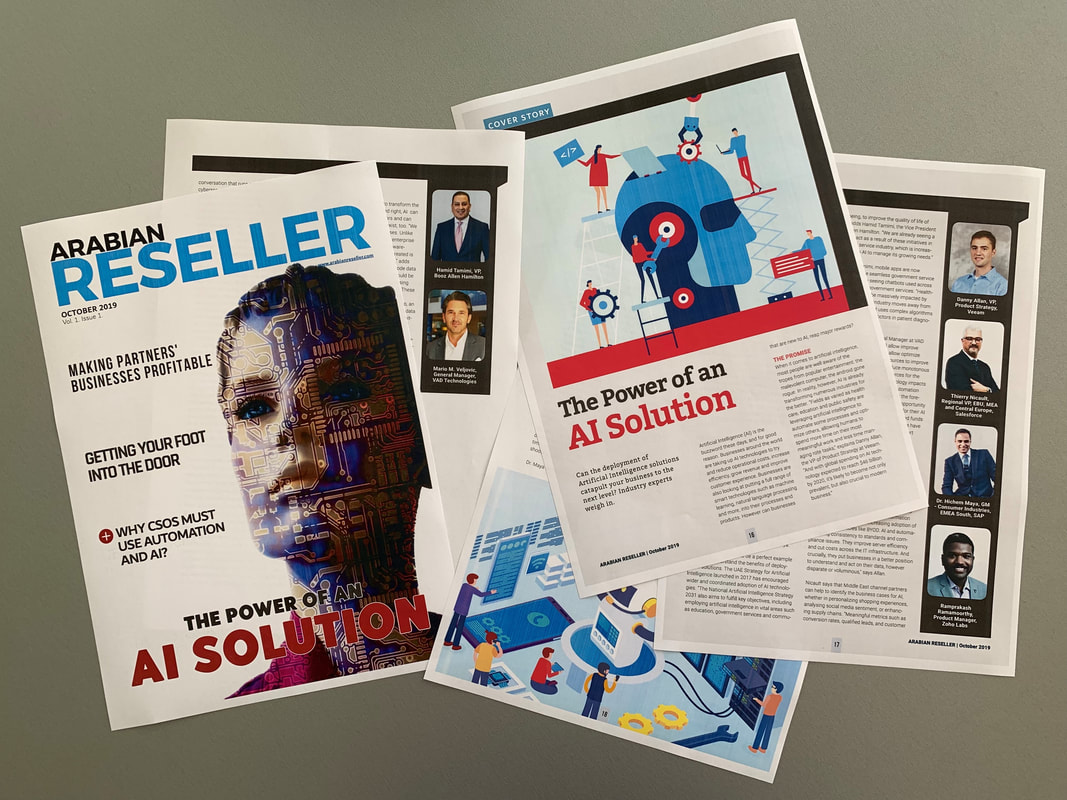|
Arabian Reseller Magazine’s latest feature from Editor Chris Fernandes looked at “The Power of an AI Solution” and spend time with VAD’s General Manager Mario M. Veljovic to get the Company’s view about AI Solutions Can the deployment of Artificial Intelligence solutions catapult your business to the next level? Industry experts weigh in. Artificial Intelligence (AI) is the buzzword these days, and for good reason. Businesses around the world are taking up AI technologies to try and reduce operational costs, increase efficiency, grow revenue and improve customer experience. Businesses are also looking at putting a full range of smart technologies such as machine learning, natural language processing and more, into their processes and products. However can businesses that are new to AI, reap major rewards? The Promise
When it comes to artificial intelligence, most people are well aware of the tropes from popular entertainment: the malevolent computer, the android gone rogue. In reality, however, AI is already transforming numerous industries for the better. “Fields as varied as health care, education and public safety are leveraging artificial intelligence to automate some processes and optimize others, allowing humans to spend more time on their most meaningful work and less time managing rote tasks,” explains Danny Allan, the VP of Product Strategy at Veeam. “And with global spending on AI technology expected to reach $46 billion by 2020, it’s likely to become not only prevalent, but also crucial to modern business.” Thierry Nicault, the Regional Vice-President Enterprise Business Unit (EBU) for Middle East, Africa and Central Europe at Salesforce, agrees that AI is fast catching up and impacting our daily lives. “AI is making a major impact across businesses and our daily lives, especially in personalized experiences at scale. One of the most common uses of AI, especially in the Middle East, is in marketing and retail experiences. For example, our recent State of the Connected Customer survey shows that 64% of customers expect tailored engagement based on previous interactions, and 62% of customers expect companies to adapt their personalization,” adds Nicault. According to Ramprakash Ramamoorthy, the Product Manager at Zoho Labs, AI is making life easier for both consumers and enterprises. “The goal of any business is to maximize profits, improve productivity, and enhance the customer experience, and AI is being aggressively deployed on all these fronts. For example, poorly designed interactive voice response (IVR) systems will be a thing of past very soon. We have smart chat bots that can answer most customer questions and escalate unanswerable questions to a human rep. In this way, the customer is happy that they have got an easier resolution to the query. The human support rep can spend their time more productively solving critical issues and the enterprise saves on costs in the process,” he adds. Meanwhile, Dr. Hichem Maya, the General Manager for Consumer Industries for EMEA South at SAP is of the opinion that AI is a fundamental technology that is transforming businesses and people’s daily lives across the Middle East. “This is happening from smart cities directing traffic, to digital patient records enhancing patient care, and banks approving loans in minutes. Organizations that leverage smart automation with AI can also free people from monotonous or dangerous tasks and enable them to work on creative solutions. In the Fourth Industrial Revolution, one of the best examples of AI in action are with factory robots that can complement people in what experts are calling “augmented humanity,” adds Dr. Maya. Regionally, UAE seems to be a perfect example in order to understand the benefits of deploying AI solutions. The UAE Strategy for Artificial Intelligence launched in 2017 has encouraged wider and coordinated adoption of AI technologies. “The National Artificial Intelligence Strategy 2031 also aims to fulfill key objectives, including employing artificial intelligence in vital areas such as education, government services and community wellbeing, to improve the quality of life of citizens,” adds Hamid Tamimi, the Vice President at Booz Allen Hamilton. “We are already seeing a positive impact as a result of these initiatives in the customer service industry, which is increasingly turning to AI to manage its growing needs.” According to Tamimi, mobile apps are now designed to enable seamless government service delivery and we are seeing chatbots used across retail, banking, and government services. “Healthcare is also going to be massively impacted by AI in the future as the industry moves away from traditional methods and uses complex algorithms and software to assist doctors in patient diagnosis,” he adds. Mario M. Veljovic, the General Manager at VAD Technologies says that AI will allow improve manufacturing processes and allow optimize many workflows to allocate resources to improve efficiency. “AI will also help to reduce monotonous work and support allocating resources for the wellbeing of employees. The technology impacts all aspects, but Business Process Automation and Physical Security is very much at the forefront,” he explains. “Partners have the opportunity to support their clients to find true ROI for their AI projects and ultimately create the required funds to finance such projects. Channel partners have to get involved as soon as possible and start such conversations with their clients.” The Opportunity According to Veeam’s Danny Allan, AI can transform data management. “In this space, true innovation isn’t just about capturing more data— it’s about having it always available, responding to it and separating signal from noise in order to improve processes and drive better business decisions. In the data center alone, AI and automation are giving companies new ways to meet the challenges of our age of information hyper-sprawl, the result of increasing adoption of the cloud and policies like BYOD. AI and automation bring consistency to standards and compliance issues. They improve server efficiency and cut costs across the IT infrastructure. And crucially, they put businesses in a better position to understand and act on their data, however disparate or voluminous,” says Allan. Nicault says that Middle East channel partners can help to identify the business cases for AI, whether in personalizing shopping experiences, analysing social media sentiment, or enhancing supply chains. “Meaningful metrics such as conversion rates, qualified leads, and customer lifetime value can demonstrate how AI can optimize costs and revenue,” he adds. “Using AI-powered predictions and recommendations, Middle East organisations can make decisions faster, make employees more productive, and make customers happier.” In the last decade, there has been a heavy focus on process automation. This let us accumulate reams of data. With phenomenally good computing power and volumes of accumulated data, the rise of AI was inevitable. Now, we are moving from process automation to decision automation using AI. “With the wealth of historical data available, AI can effectively identify patterns without humans writing explicit rules. It can also effectively forecast events by seeing patterns not obvious to human eyes. All of these traits make AI the key to the Fourth Industrial Revolution,” says Ramamoorthy. Ramamoorthy also says that AI can be a productivity booster by automating redundant tasks, freeing up humans to work on more critical tasks that require their attention. “For example, when your website goes down, even if just for a couple of minutes, that translates to a revenue loss. The hit to the reputation that comes with an outage may even be costlier. An AI-enabled monitoring system can proactively predict outages even before they happen and also explain what signal might reveal the root cause of the outage. This is the productivity boost that we are talking about. Workforces can receive a notification on possible future outages and takes steps to prevent them altogether, saving them time and resources that would have otherwise been spent troubleshooting,” he explains. Dr. Maya explains that AI has reached the tipping point among the region’s organizations and channel partners, especially in the UAE thanks to the UAE AI Strategy 2031 and the Ministry of State for Artificial Intelligence. “More than 70% of MENA’s digital leaders are investing in AI and machine learning, making it among the top three most heavily-invested technologies this year, according to the recent SAP and Oxford Economics Digital Transformation Executive Study. Middle East IT decision-makers agree that cloud is important for integrating AI, machine learning, Internet of Things, and blockchain, including 83% in KSA and 76% in the UAE, according to a recent YouGov survey,” reiterates Dr. Maya. The fourth industrial revolution includes a number of transformational technologies such as robotics, artificial intelligence (AI), the Internet of Things (IoT) and 3D printing, to name a few. AI is one of the most crucial technologies driving the fourth industrial revolution through machine learning and deep learning. “AI has tremendous potential and use cases across industries, including retail, security, healthcare, and transportation. To take it to the next stage, companies that are serious about taking up AI must focus on two things – the business case benefits and the use case benefits and they must adopt a nimble and phased approach to start building momentum,” says Tamimi. “According to technology and research firm Venture Scanner, the adoption of AI technologies in marketing organizations has increased by 44% in 2018, as compared to 2017. The use of AI by customer service teams is projected to increase by 143% over the next 18 months.” The Challenges As automation evolves into artificial intelligence, it’s up to businesses to build data availability into their tools and processes from the beginning, rather than bolting it on after the fact. It’s a conversation that runs parallel to the world of cybersecurity, where defending a company’s perimeter from cyber attackers all too often becomes an afterthought. “But now, with philosophies like DevSecOps encouraging businesses to make security a baked-in part of software development, we’re beginning to see a shift in thinking. In data management, the same principle applies—particularly for businesses leveraging AI and machine learning as part of their availability strategy,” explains Allan. One of the biggest challenges to implementing AI is the perceived threat of redundancy or job loss. But in reality, AI should be implemented to repurpose the energy in the labour market rather than make it redundant. “AI can help bring efficiency in the workforce, as labour intensive and monotonous tasks can be taken up machines, while humans focus on higher-level qualitative tasks. According to a report from the World Economic Forum (WEF), despite machines and algorithms displacing 75 million jobs by 2022, they will create 133 million new roles by the same time period,” adds Tamimi. The Path to an AI Solution Becoming a hyper-available, AI-assisted enterprise doesn’t happen overnight. Arriving at this point is a gradual process, although each step comes with substantial benefits. Artificial intelligence never starts with artificial intelligence. There are always algorithms upfront, then machine learnings and eventually you get to AI. In some corners, it’s already extremely well-entrenched. For instance, many companies use network edge detection systems to determine whether malware is attacking. These companies can then take a snapshot of the data to make a definitive determination without a human becoming involved. Contrary to how it’s often presented, investing in AI doesn’t mean removing humans from the equation. “Though the technology is rapidly becoming more advanced, it would be a mistake to fully trust machines to handle complex processes, particularly those impacting availability,” explains Allan. “We think of AI in the province of data replication the same way you might think about a self-driving car. You wouldn’t want a network disruption or a network data management protocol packet to disappear when all of a sudden the entire workload moves to the cloud. There still needs to be a person saying, ‘Yes, allow that to take place,’ with automation working up until that point.” AI vendors have the opportunity to transform the way the industry works. When used right, AI can help differentiation from competitors and can add substantial value. Challenges exist, too. “We still have a data problem in most cases. Unlike clickstream data in social networks, enterprise data is limited. There is also a lot of awareness in recent times about how data created is processed and who all has access to it,” adds Ramamoorthy. “AI systems by nature erode data boundaries. So vendors and partners should be doubly careful with the strict data processing regulations and ensure data is used right. These challenges will be the opportunities for the vendor and partner ecosystem. Summing up, an AI system that is explainable complies with data access regulations, and works better with limited amounts of data is going to be the winner.” Whatever your reason for considering AI, the potential is there for it to change the way businesses operate. All it takes to start is an open-minded attitude and a willingness to embrace new opportunities wherever and whenever possible. “SAP’s Channel Partner Program is continuing to train channel partners on integrating AI into digital transformation agendas, and finding the right business cases that meet the needs for AI,” adds Dr. Maya. “Our industry-leading solutions, such as SAP Leonardo and the SAP C/4HANA customer experience suite, are integrating AI for real-time insights on the X’s of experience data and O’s of operational data to drive new levels of digital business innovation.” According to UBS, AI has the potential to reach a market cap of $120-180 billion by 2020, therefore it represents a tremendous revenue growth opportunity. “Take for example in the UAE, the government has unveiled a strategy to position the country as a hub for AI by leveraging AI technology across government services and the private sector. It also aims to recruit and train people to work in industries that will employ AI in the near future. This is a huge opportunity for companies looking to grow their AI capabilities in the future,” says Tamimi. As an industry, we’re at an inflection point where we’re beginning to build resiliency and dependability into our systems. The first step is to recognize that it’s a journey. There are steps to go through and practices to learn along the way in order to achieve that resiliency. And it’s not just about recovering faster — it’s actually lowering costs for the organization. It’s helping them deliver better ROIs. The full Feature and the inaugural October 2019 Edition of Arabian Reseller can be found online here: http://arabianreseller.com/2019/10/09/the-power-of-an-ai-solution/ http://arabianreseller.com/2019/10/05/arabian-reseller-october-2019-the-power-of-an-ai-solution/
2 Comments
piyal chowdhury
31/10/2023 06:50:35 am
Great job on your blog post! The content was engaging, and I appreciated the way you structured the information. It was easy to follow along and stay engaged throughout. To gain further insights, <a href="https://jvz4.com/c/2974499/399931/" target="_blank">click here</a>.
Reply
Joan
26/2/2024 07:00:59 pm
Thank you for sharing this insightful and well-researched blog post. The information you presented was thorough and comprehensive, and I appreciated the depth of your analysis. To explore more, <a href="https://jvz2.com/c/3122633/397078" target="_blank">click here</a>.
Reply
Leave a Reply. |
Archives
February 2024
Categories |
ServicesSales
Pre-sales Training Marketing Finance Logistics |
Company |
|


 RSS Feed
RSS Feed
